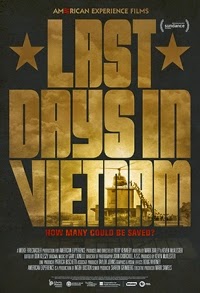Last Days in Vietnam
One of the nominees for Best Documentary Feature at the last Oscars was Last Days in Vietnam, directed by Rory Kennedy. It's a very focused film on one aspect of a very large topic--the Vietnam War. But the film is centered on, as the title suggests, the last days, meaning that period after the Paris Accords in 1973, when the U.S. pulled its troops out of Vietnam, and then what happened after that.
Last Days in Vietnam is a very meat and potatoes documentary--it's talking heads mixed with stock footage. The interviewees are those that were there when the U.S. embassy was evacuated in 1975, and thousands of South Vietnamese refugees attempted to escape as well. They wanted out because they had worked with Americans, which meant prison or worse once the North Vietnamese took over Saigon.
A cease fire had been settled in '73, but the Viet Cong weren't done. After Nixon resigned, they invaded the South (according to the film, they thought Nixon was a "madman" and were afraid of him). New President Ford wanted money to go back in and stop them, but Congress, following Watergate and the general distaste for war after Vietnam, said no. It was the only time Press Secretary Ron Nessen heard Ford swear.
As the Viet Cong encroached, Ambassador Graham Martin pooh-poohed talk of a need for evacuation, stoically and foolishly balking at plans that would have been far easier than what they ended up using--helicopters. Refugees were dropped in the courtyard on the embassy, and then taken out to ships at sea. Even South Vietnamese pilots absconded with helicopters, which were then pushed off of American ships like so much garbage.
Eventually Martin left, looking haggard and defeated, but the U.S. stopped taking any more refugees. Eleven Marines were left behind, too, hearing the Viet Cong on their way. They were on the roof of the embassy, waiting for a rocket to take it out, when a last helicopter finally showed up.
This is all told in crisp, no nonsense style. The witnesses were those who where there, such as a captain who promised all the Vietnamese they wouldn't be left behind, but then was ordered to break his promise, and the CO of the U.S. Kirk, which accommodated most of the refugees. What comes through with all these military men is that they were concerned with the refugees wholeheartedly--no one was turned away (many escaped by boat later). The entire enterprise rang with such humanity that I had to swallow my cynicism.
Also interviewed, besides Nessen, was Henry Kissinger, who, whatever you feel about him, speaks honestly and forthrightly.
This film is an episode of PBS' American Experience, and it shows, as it's not visually interesting, beyond the startling images of some of the stock footage. Kennedy simply lets the words and pictures tell the story, and for the most part that's fine, although at times it seems a little dry.
Last Days in Vietnam is a very meat and potatoes documentary--it's talking heads mixed with stock footage. The interviewees are those that were there when the U.S. embassy was evacuated in 1975, and thousands of South Vietnamese refugees attempted to escape as well. They wanted out because they had worked with Americans, which meant prison or worse once the North Vietnamese took over Saigon.
A cease fire had been settled in '73, but the Viet Cong weren't done. After Nixon resigned, they invaded the South (according to the film, they thought Nixon was a "madman" and were afraid of him). New President Ford wanted money to go back in and stop them, but Congress, following Watergate and the general distaste for war after Vietnam, said no. It was the only time Press Secretary Ron Nessen heard Ford swear.
As the Viet Cong encroached, Ambassador Graham Martin pooh-poohed talk of a need for evacuation, stoically and foolishly balking at plans that would have been far easier than what they ended up using--helicopters. Refugees were dropped in the courtyard on the embassy, and then taken out to ships at sea. Even South Vietnamese pilots absconded with helicopters, which were then pushed off of American ships like so much garbage.
Eventually Martin left, looking haggard and defeated, but the U.S. stopped taking any more refugees. Eleven Marines were left behind, too, hearing the Viet Cong on their way. They were on the roof of the embassy, waiting for a rocket to take it out, when a last helicopter finally showed up.
This is all told in crisp, no nonsense style. The witnesses were those who where there, such as a captain who promised all the Vietnamese they wouldn't be left behind, but then was ordered to break his promise, and the CO of the U.S. Kirk, which accommodated most of the refugees. What comes through with all these military men is that they were concerned with the refugees wholeheartedly--no one was turned away (many escaped by boat later). The entire enterprise rang with such humanity that I had to swallow my cynicism.
Also interviewed, besides Nessen, was Henry Kissinger, who, whatever you feel about him, speaks honestly and forthrightly.
This film is an episode of PBS' American Experience, and it shows, as it's not visually interesting, beyond the startling images of some of the stock footage. Kennedy simply lets the words and pictures tell the story, and for the most part that's fine, although at times it seems a little dry.



Comments
Post a Comment